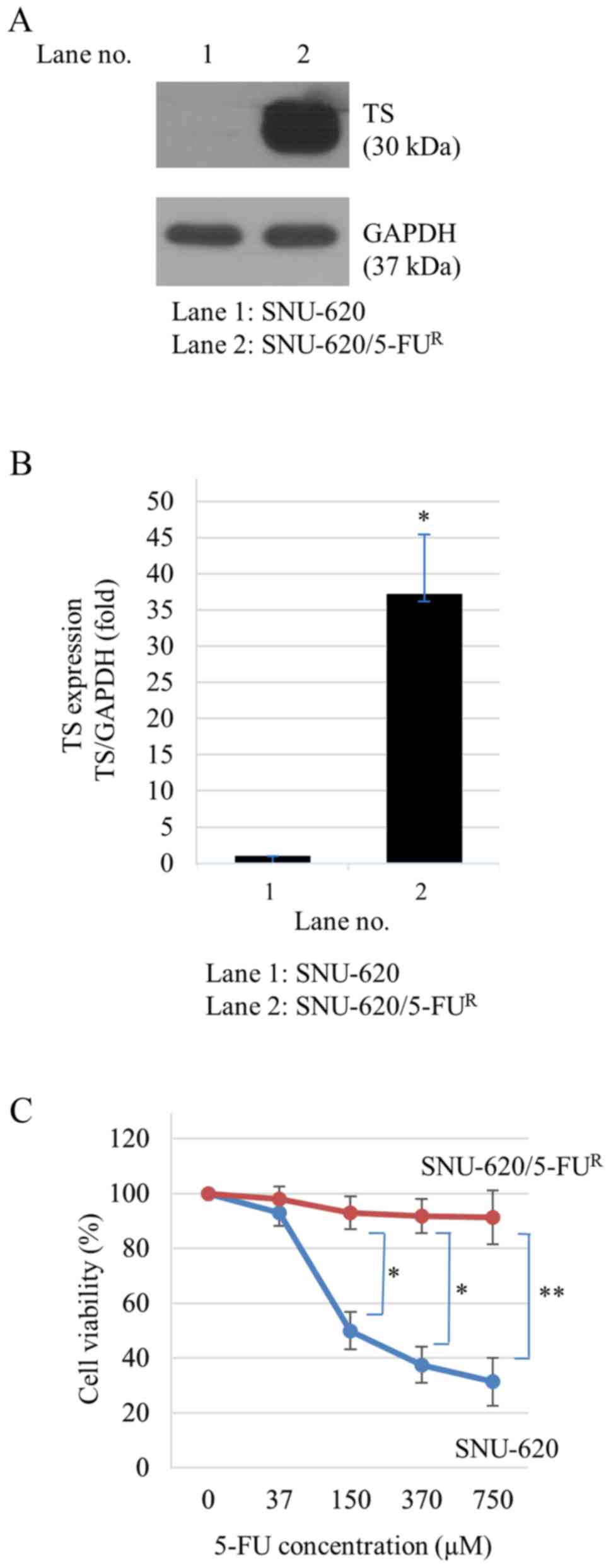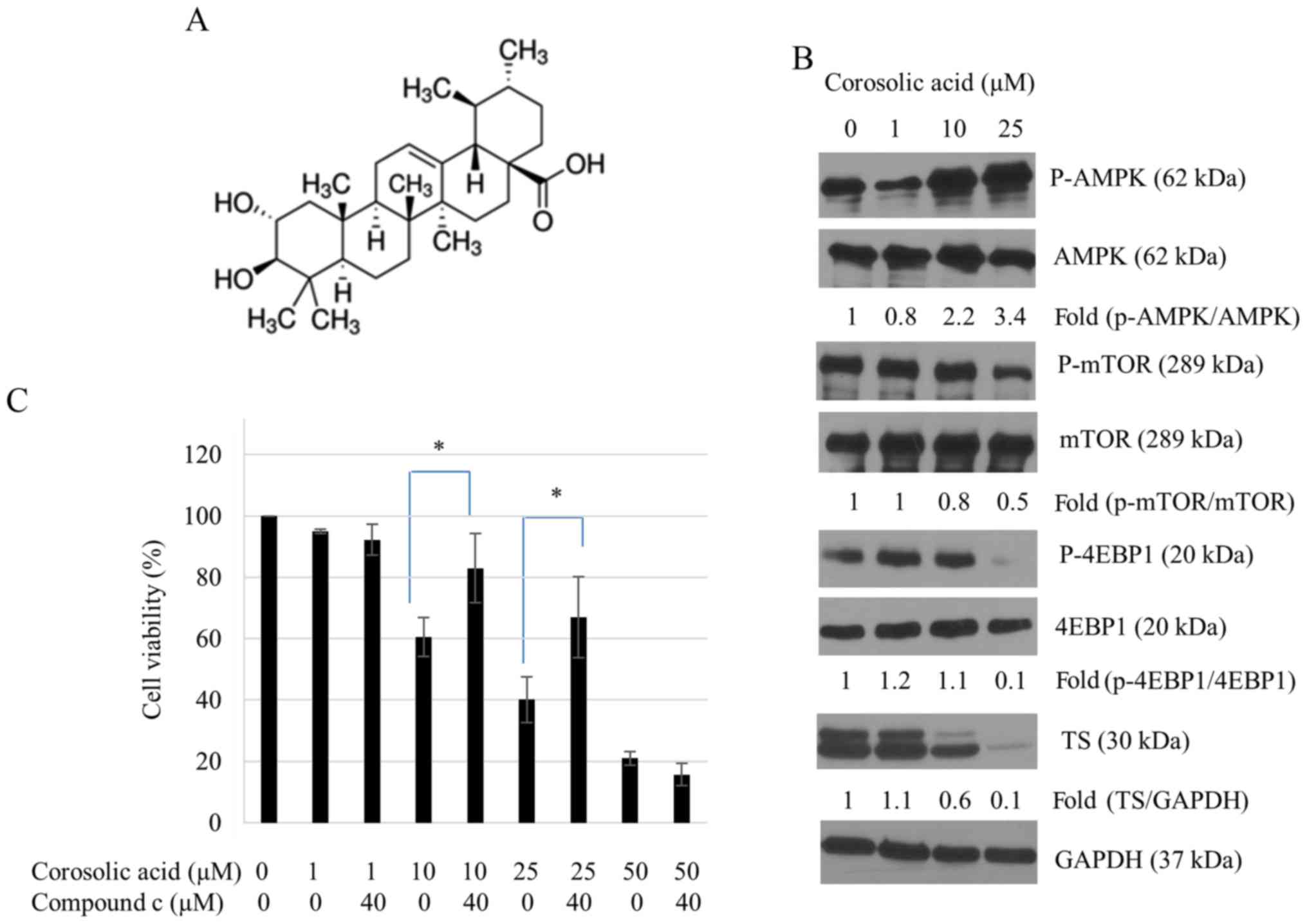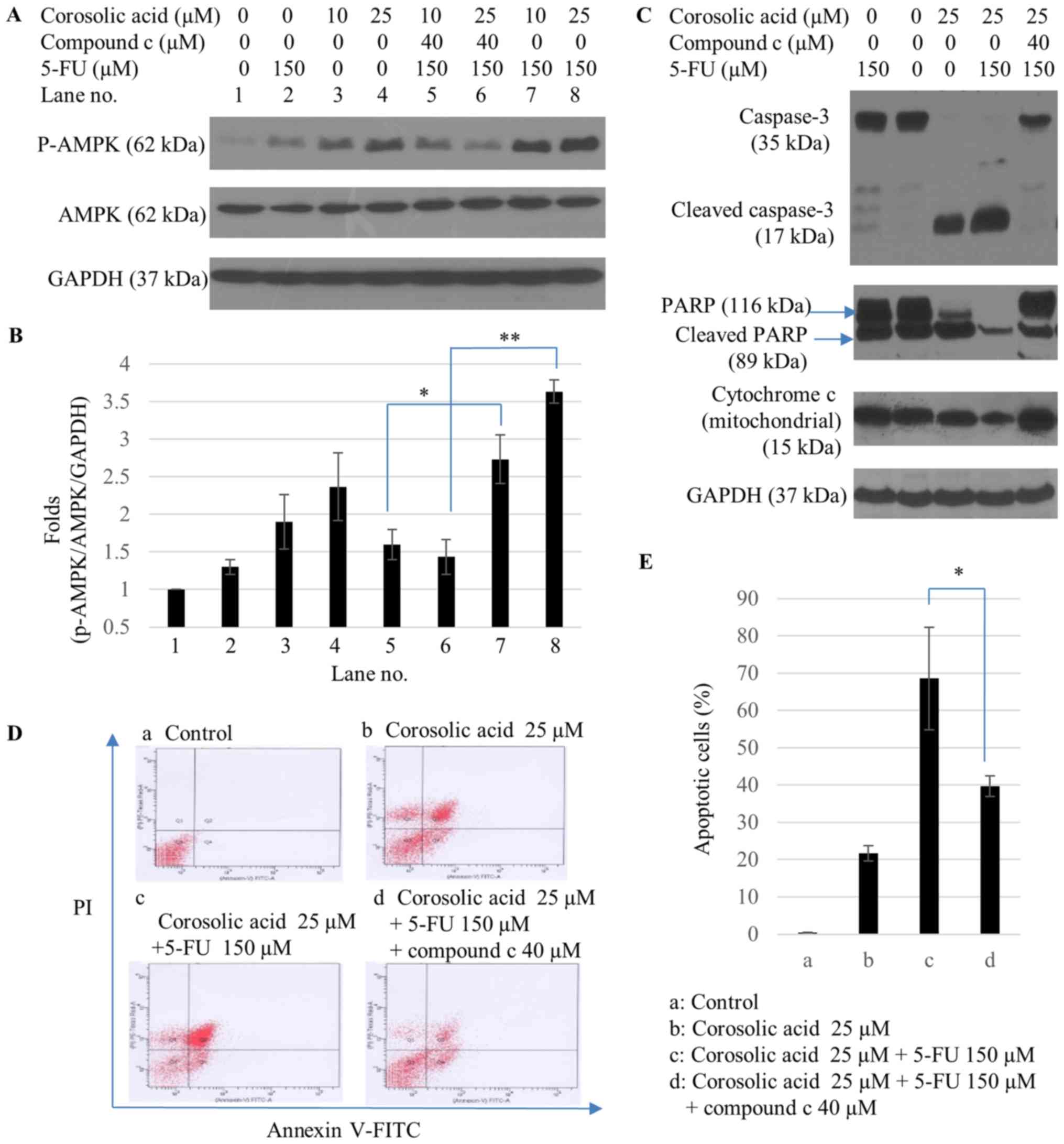|
1
|
Smith JK, McPhee JT, Hill JS, Whalen GF,
Sullivan ME, Litwin DE, Anderson FA and Tseng JF: National outcomes
after gastric resection for neoplasm. Arch Surg. 142:387–393. 2007.
View Article : Google Scholar : PubMed/NCBI
|
|
2
|
Tsai MM, Wang CS, Tsai CY, Chi HC, Tseng
YH and Lin KH: Potential prognostic, diagnostic and therapeutic
markers for human gastric cancer. World J Gastroenterol.
20:13791–13803. 2014. View Article : Google Scholar : PubMed/NCBI
|
|
3
|
Zhang N, Yin Y, Xu SJ and Chen WS:
5-Fluorouracil: Mechanisms of resistance and reversal strategies.
Molecules. 13:1551–1569. 2008. View Article : Google Scholar : PubMed/NCBI
|
|
4
|
Scartozzi M, Maccaroni E, Giampieri R,
Pistelli M, Bittoni A, Del Prete M, Berardi R and Cascinu S:
5-Fluorouracil pharmacogenomics: Still rocking after all these
years? Pharmacogenomics. 12:251–265. 2011. View Article : Google Scholar : PubMed/NCBI
|
|
5
|
Johnston PG, Lenz HJ, Leichman CG,
Danenberg KD, Allegra CJ, Danenberg PV and Leichman L: Thymidylate
synthase gene and protein expression correlate and are associated
with response to 5-fluorouracil in human colorectal and gastric
tumors. Cancer Res. 55:1407–1412. 1995.PubMed/NCBI
|
|
6
|
Saga Y, Suzuki M, Mizukami H, Urabe M,
Fukushima M, Ozawa K and Sato I: Enhanced expression of thymidylate
synthase mediates resistance of uterine cervical cancer cells to
radiation. Oncology. 63:185–191. 2002. View Article : Google Scholar : PubMed/NCBI
|
|
7
|
Copur S, Aiba K, Drake JC, Allegra CJ and
Chu E: Thymidylate synthase gene amplification in human colon
cancer cell lines resistant to 5-fluorouracil. Biochem Pharmacol.
49:1419–1426. 1995. View Article : Google Scholar : PubMed/NCBI
|
|
8
|
Fakhrejahani E, Miyamoto A and Tanigawa N:
Correlation between thymidylate synthase and dihydropyrimidine
dehydrogenase mRNA level and in vitro chemosensitivity to
5-fluorouracil, in relation to differentiation in gastric cancer.
Cancer Chemother Pharmacol. 60:437–446. 2007. View Article : Google Scholar : PubMed/NCBI
|
|
9
|
Kim YH, Liang H, Liu X, Lee JS, Cho JY,
Cheong JH, Kim H, Li M, Downey TJ, Dyer MD, et al: AMPKα modulation
in cancer progression: Multilayer integrative analysis of the whole
transcriptome in Asian gastric cancer. Cancer Res. 72:2512–2521.
2012. View Article : Google Scholar : PubMed/NCBI
|
|
10
|
Ling S, Tian Y, Zhang H, Jia K, Feng T,
Sun D, Gao Z, Xu F, Hou Z, Li Y and Wang L: Metformin reverses
multidrug resistance in human hepatocellular carcinoma
Bel-7402/5-fluorouracil cells. Mol Med Rep. 10:2891–2897. 2014.
View Article : Google Scholar : PubMed/NCBI
|
|
11
|
Qu C, Zhang W, Zheng G, Zhang Z, Yin J and
He Z: Metformin reverses multidrug resistance and
epithelial-mesenchymal transition (EMT) via activating
AMP-activated protein kinase (AMPK) in human breast cancer cells.
Mol Cell Biochem. 386:63–71. 2014. View Article : Google Scholar : PubMed/NCBI
|
|
12
|
Wu Y, Qi Y, Liu H, Wang X, Zhu H and Wang
Z: AMPK activator AICAR promotes 5-FU-induced apoptosis in gastric
cancer cells. Mol Cell Biochem. 411:299–305. 2016. View Article : Google Scholar : PubMed/NCBI
|
|
13
|
Hua HW, Jiang F, Huang Q, Liao ZJ and Ding
G: Re-sensitization of 5-FU resistance by SPARC through negative
regulation of glucose metabolism in hepatocellular carcinoma.
Tumour Biol. 36:303–313. 2015. View Article : Google Scholar : PubMed/NCBI
|
|
14
|
Hou W, Li Y, Zhang Q, Wei X, Peng A, Chen
L and Wei Y: Triterpene acids isolated from Lagerstroemia
speciosa leaves as alpha-glucosidase inhibitors. Phytother Res.
23:614–618. 2009. View
Article : Google Scholar : PubMed/NCBI
|
|
15
|
Thuong PT, Min BS, Jin W, Na M, Lee J,
Seong R, Lee YM, Song K, Seong Y, Lee HK, et al: Anti-complementary
activity of ursane-type triterpenoids from Weigela
subsessilis. Biol Pharm Bull. 29:830–833. 2006. View Article : Google Scholar : PubMed/NCBI
|
|
16
|
Fukushima M, Matsuyama F, Ueda N, Egawa K,
Takemoto J, Kajimoto Y, Yonaha N, Miura T, Kaneko T, Nishi Y, et
al: Effect of corosolic acid on postchallenge plasma glucose
levels. Diabetes Res Clin Pract. 73:174–177. 2006. View Article : Google Scholar : PubMed/NCBI
|
|
17
|
Miura T, Ueda N, Yamada K, Fukushima M,
Ishida T, Kaneko T, Matsuyama F and Seino Y: Antidiabetic effects
of corosolic acid in KK-Ay diabetic mice. Biol Pharm Bull.
29:585–587. 2006. View Article : Google Scholar : PubMed/NCBI
|
|
18
|
Xu Y, Zhao Y, Xu Y, Guan Y, Zhang X, Chen
Y, Wu Q, Zhu G, Chen Y, Sun F, et al: Blocking inhibition to YAP by
ActinomycinD enhances anti-tumor efficacy of Corosolic acid in
treating liver cancer. Cell Signal. 29:209–217. 2017. View Article : Google Scholar : PubMed/NCBI
|
|
19
|
Sung B, Kang YJ, Kim DH, Hwang SY, Lee Y,
Kim M, Yoon JH, Kim CM, Chung HY and Kim ND: Corosolic acid induces
apoptotic cell death in HCT116 human colon cancer cells through a
caspase-dependent pathway. Int J Mol Med. 33:943–949. 2014.
View Article : Google Scholar : PubMed/NCBI
|
|
20
|
Nho KJ, Chun JM and Kim HK: Corosolic acid
induces apoptotic cell death in human lung adenocarcinoma A549
cells in vitro. Food Chem Toxicol. 56:8–17. 2013. View Article : Google Scholar : PubMed/NCBI
|
|
21
|
Lee HS, Park JB, Lee MS, Cha EY, Kim JY
and Sul JY: Corosolic acid enhances 5-fluorouracil-induced
apoptosis against SNU-620 human gastric carcinoma cells by
inhibition of mammalian target of rapamycin. Mol Med Rep.
12:4782–4788. 2015. View Article : Google Scholar : PubMed/NCBI
|
|
22
|
Lee MS, Cha EY, Thuong PT, Kim JY, Ahn MS
and Sul JY: Down-regulation of human epidermal growth factor
receptor 2/neu oncogene by corosolic acid induces cell cycle arrest
and apoptosis in NCI-N87 human gastric cancer cells. Biol Pharm
Bull. 33:931–937. 2010. View Article : Google Scholar : PubMed/NCBI
|
|
23
|
Yang J, Leng J, Li JJ, Tang JF, Li Y, Liu
BL and Wen XD: Corosolic acid inhibits adipose tissue inflammation
and ameliorates insulin resistance via AMPK activation in high-fat
fed mice. Phytomedicine. 23:181–190. 2016. View Article : Google Scholar : PubMed/NCBI
|
|
24
|
Li Y, Zhou ZH, Chen MH, Yang J, Leng J,
Cao GS, Xin GZ, Liu LF, Kou JP, Liu BL, et al: Inhibition of
mitochondrial fission and NOX2 expression prevent NLRP3
inflammasome activation in the endothelium: The role of corosolic
acid action in the amelioration of endothelial dysfunction.
Antioxid Redox Signal. 24:893–908. 2016. View Article : Google Scholar : PubMed/NCBI
|
|
25
|
Lee MS, Lee CM, Cha EY, Thuong PT, Bae K,
Song IS, Noh SM and Sul JY: Activation of AMP-activated protein
kinase on human gastric cancer cells by apoptosis induced by
corosolic acid isolated from Weigela subsessilis. Phytother
Res. 24:1857–1861. 2010. View
Article : Google Scholar : PubMed/NCBI
|
|
26
|
Goel A and Aggarwal BB: Curcumin, the
golden spice from Indian saffron, is a chemosensitizer and
radiosensitizer for tumors and chemoprotector and radioprotector
for normal organs. Nutr Cancer. 62:919–930. 2010. View Article : Google Scholar : PubMed/NCBI
|
|
27
|
Tang H, Zhang X, Cui S, Wang J, Ruan Q,
Huang Y and Yang D: Role and mechanism research on reversal of
5-fluorouracil resistance by epigallocatechin gallate in gastric
cancer drug-resistance cells lines SGC-7901/5-FU. Zhonghua Wei
Chang Wai Ke Za Zhi. 19:1170–1175. 2016.(In Chinese). PubMed/NCBI
|
|
28
|
Liao F, Yang Z, Lu X, Guo X and Dong W:
Sinomenine sensitizes gastric cancer cells to 5-fluorouracil in
vitro and in vivo. Oncol Lett. 6:1604–1610. 2013. View Article : Google Scholar : PubMed/NCBI
|
|
29
|
Kato K, Gong J, Iwama H, Kitanaka A, Tani
J, Miyoshi H, Nomura K, Mimura S, Kobayashi M, Aritomo Y, et al:
The antidiabetic drug metformin inhibits gastric cancer cell
proliferation in vitro and in vivo. Mol Cancer Ther. 11:549–560.
2012. View Article : Google Scholar : PubMed/NCBI
|
|
30
|
Kim DC, Park KR, Jeong YJ, Yoon H, Ahn MJ,
Rho GJ, Lee J, Gong YD and Han SY: Resistance to the c-Met
inhibitor KRC-108 induces the epithelial transition of gastric
cancer cells. Oncol Lett. 11:991–997. 2016. View Article : Google Scholar : PubMed/NCBI
|
|
31
|
Holohan C, Van Schaeybroeck S, Longley DB
and Johnston PG: Cancer drug resistance: An evolving paradigm. Nat
Rev Cancer. 13:714–726. 2013. View Article : Google Scholar : PubMed/NCBI
|
|
32
|
Wang W and Guan KL: AMP-activated protein
kinase and cancer. Acta Physiol (Oxf). 196:55–63. 2009. View Article : Google Scholar : PubMed/NCBI
|
|
33
|
Hadad SM, Baker L, Quinlan PR, Robertson
KE, Bray SE, Thomson G, Kellock D, Jordan LB, Purdie CA, Hardie DG,
et al: Histological evaluation of AMPK signaling in primary breast
cancer. BMC Cancer. 9:3072009. View Article : Google Scholar : PubMed/NCBI
|
|
34
|
Liu X, Chhipa RR, Nakano I and Dasgupta B:
The AMPK inhibitor compound C is a potent AMPK-independent
antiglioma agent. Mol Cancer Ther. 13:596–605. 2014. View Article : Google Scholar : PubMed/NCBI
|
|
35
|
Tseng CH: Metformin reduces gastric cancer
risk in patients with type 2 diabetes mellitus. Aging (Albany NY).
8:1636–1649. 2016. View Article : Google Scholar : PubMed/NCBI
|
|
36
|
Gao H, Xie J, Peng J, Han Y, Jiang Q, Han
M and Wang C: Hispidulin inhibits proliferation and enhances
chemosensitivity of gallbladder cancer cells by targeting HIF-1α.
Exp Cell Res. 332:236–246. 2015. View Article : Google Scholar : PubMed/NCBI
|



















